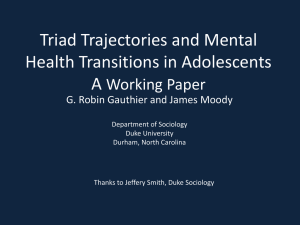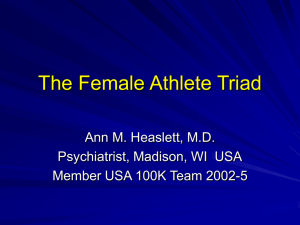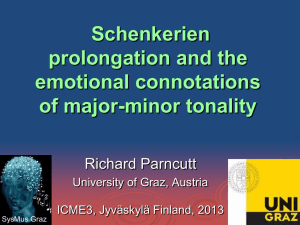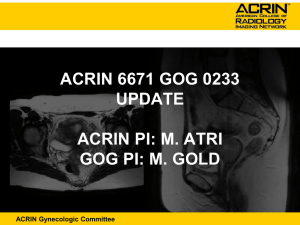Imaging
advertisement
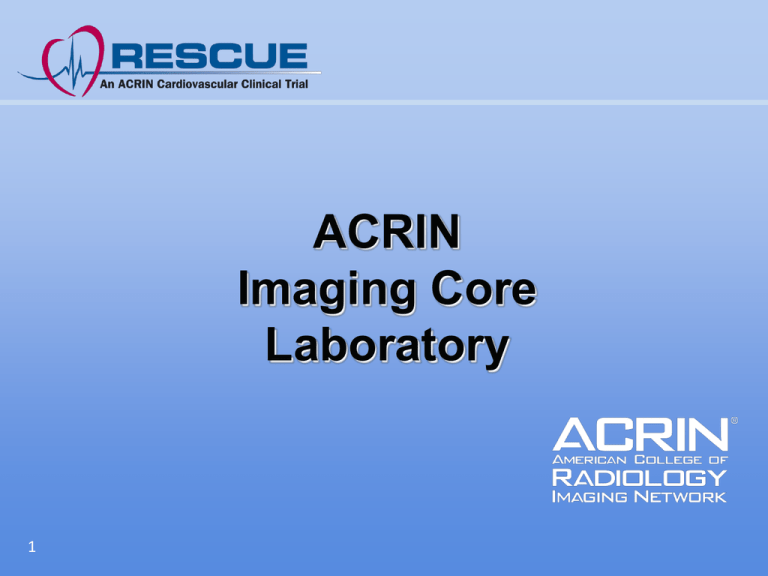
ACRIN Imaging Core Laboratory 1 • Aim 1: To ensure uniformity and high quality of test performance, image acquisition and image interpretation throughout the trial • Aim 2: To develop/deploy technical systems for test transmission and archiving, including creation of a unique data resource for ancillary studies by combining diagnostic tests and clinical data 2 TRIAD Installation & Sample Data Transfer 3 TRIAD • TRIAD is the American College of Radiology Imaging Network’s (ACRIN) image acquisition and management software. In brief, TRIAD-OA offers a web-based software solution which allows sites participating in the RESCUE trial a secure method to review and submit clinical trial images. For a more detailed explanation of the capabilities and benefits of TRIAD, you may visit the TRIAD learning center at: https://triad.acr.org/ TRIAD REGISTRATION and DEPLOYMENT TRIAD DEPLOYMENT • Identify the following key individuals at your site: • TRIAD user – the individual(s) who will use TRIAD regularly • IT contact – the individual(s) who will assist with the basic installation and testing of the TRIAD software • PACS administrator (if necessary) – the individual(s) who will assist with transporting case images from the scanner/PACS system to TRIAD • Register for a TRIAD account – this may be done by clicking on the following link: https://triad.acr.org/Web/UserAccount/Register.aspx • Determine the computer(s) which you would like TRIAD installed on (this machine does not need to be used solely for TRIAD) • Determine a time and date that would work best to schedule the TRIAD installation •Prior to a TRIAD installation please register for a username & password @ https://triad.acr.org/Web/U serAccount/Register.aspx TRIAD INSTALLATION • If you feel your site is ready to proceed with the TRIAD installation, please submit an e-mail to TRIADSupport@phila.acr.org. Include the following information with your e-mail: 1) date and time you would like the installation to take place, 2) individuals who plan to participate in the installation, 3) site name and number and 4) contact information. Selecting TRIAD Options • TRIAD: TRansfer of Image and Archive Data • TRIAD setup is customizable with two (2) basic options for submission of images originating from, or routed through, the Clinical Site 9 TRIAD Client • Installation of TRIAD client application only • For submission of images directly from CD or folders • Recommended for low volume sites -Fewer than five (5) CCTA submissions/month TRIAD Site Server • Installation of TRIAD client application and TRIAD site server • For submission of images transferred directly from a site’s PACS or Scanner on the same local area network • Recommended for high volume sites - five (5) or more CTA submissions/month TRIAD Client Hardware and Network Requirements: • Model: PC • Processor: Intel P-IV 3 GHz minimum, Intel Core 2 Duo 2GHz is recommended • RAM: 1GB is minimum, 4GB is recommended • HDD: 200Mb for Rich GUI client application itself up to 200Gb- for local image cache, its size will depend on amount of images stored by the system • Video: Graphic adapter and Monitor with True Color mode support 1024 x 768 pixels x 32 bit color mode • Supported Operating systems and Software Requirements: Workstation running Rich GUI client must be: MS Windows XP SP3, MS Windows 7, MS.NET Framework 3.5 • Network Requirements: Internet connection- minimum Client connection speed should be at least 256 kbps. Desired connection speed is 1 Mbps. 12 TRIAD Site Server Supported Operating Systems and Software Requirements: • Windows XP SP3, Windows 7 and Windows Server 2003 SP2 • Microsoft .NET Framework 3.5 ,SQL Express 2005 HARDWARE REQUIREMENTS • Model: PC • Processor: Intel P-IV 3GHz minimum, Intel Core 2 Duo 2GHz is recommended • RAM: 1GB minimum, 4GB is recommended • HDD: Its size depends on amount of images received from Scanner before they are sent to TRIAD Image Storage.100 Gb minimum, 200Gb is recommended. TRIAD Letter & Consultation Call • TRIAD Greeting Letter is sent (via e-mail) to Site Study Coordinator • Prepares your organization by providing requirements for an installation • ACRIN holds site consultation call with each site • Site Study Coordinator should be prepared to confirm the following information: • Installation plan/process for image transfer • Number of TRIAD installs required • TRIAD Installation occurs on scheduled date/time • Site will be required to submit a test exam during installation to confirm successful TRIAD deployment 15 Preparing QA Datasets • One (1) CCTA and One (1) SPECT MPI should be submitted to ACRIN core lab for qualification • For sites with inadequate studies, the ACRIN core lab will review the protocol recommendations with the site, and request an additional study until the site fulfills all requirements • Once a modality’s requirements are met, an ACRIN Imaging Technologist will send a modality specific approval letter via email to the site Study Coordinator • Once all imaging modalities are approved, the RESCUE PM will send an official letter of acceptance for accrual via email to the site Study Coordinator CCTA Quality Control Procedures Image Transmittal Worksheet (ITW) must be fully completed & submitted for every CCTA exam Datasets should be consistent with Diagnostic Testing Protocol Recommendations ACRIN Image Technologists will complete Quality Control (QC) form, review data for completeness of dataset, and quality of images 19 CCTA Image Transmittal Worksheet (ITW) Form The ITW Form contains studyspecific information (i.e., Subject ID, Scan Date, Image Details Once images have been uploaded to TRIAD, the ITW should be faxed to ACRIN This form indicates that the images are on TRIAD and ready for evaluation by ACRIN • CCTA Quality Assessment: Absence of major motion artifacts Sufficient contrast enhancement <15 mSv radiation dose 21 CCTA Completeness: ITW Scout Dose Report Prospective gated non-contrast Calcium Score series (optional) Prospectively or retrospectively gated contrast enhanced scan If global and regional LV function is assessed, use of multiphase axial reconstructions (1.5mm) throughout cardiac cycle are required If routinely performed at your site, a full field of view chest scan for incidental findings CCTA Core Lab, the Cardiovascular Imaging Core Lab (CVIC) at Massachusetts General Hospital • CCTA Core Lab at MGH will assist ACRIN in the development of general and specific protocol recommendations. • The CCTA images from the first two study subjects at each site will be reviewed by the Core Lab at MGH as well as a random sample of 10% of all cases thereafter. • CCTA questions related to image acquisition or interpretation e-mail: rescuehelp@partners.org • Erin Corsini, Clinical Research Associate, Cardiovascular Imaging Core Lab, MGH SPECT MPI Quality Control Procedures Image Submission for QA and Trial data Images are sent to ACRIN electronically via TRIAD (de-identified data sets) ACRIN requests submission of images within 5 days of test RAW, Data (Rest and Stress) in DICOM format are evaluated along with results pages 100% Qualitative Evaluation is to be performed by qualified ACRIN Technologists ACRIN Technologists will provide feedback as needed to sites on image quality and data completeness SPECT Image QA/QC Criteria for SPECT Submissions: • Completeness: Rest and Stress images with complete coverage of the LV Screen Captures of processed results pages Beat Length Histogram (if available) • Quality: High-quality raw data projection images with attention to minimal motion and acceptably low levels of hepatic and bowel uptake High-quality processed SPECT data High-quality gated SPECT images with attention to beat-length histogram SPECT Image Submission Procedures SPECT Image Transmittal Worksheet (ITW) Form Nuclear Medicine Image Transmittal Worksheet ACRIN 4701 Instructions: All subject study images are transmitted to the ACRIN-Image Management Center using a predefined transfer method established with each site prior to enrollment. Each subject’s raw data is sent in an uncompressed format within 5 business days of the SPECT visit. All Protected Health Identifiers are removed from the digital images and replaced with the study subject identifiers. An Image Transmittal Worksheet (ITW) is completed during imaging and faxed to the ACRIN-Image Management Center on the day the images are transferred. If using attenuation correction it is necessary to submit BOTH the non attenuated-corrected images and the attenuated-corrected images. Please use the comments section to record images not sent or imaging limitations. The completed and signed Image Transmittal Worksheet (ITW) is faxed to the ACRIN Image Management Center fax number 215-923-1737. For further information or questions email: Rebecca Scaven, CNMT rscaven@acr.org Section I: Image Data Demographics •The ITW Form contains study-specific information (i.e., Injection Times, Isotope and Activity used, etc.) •Once images have been uploaded to TRIAD, the ITW form is faxed to ACRIN Institution Name: Test Submission: (Check only if QA Submission) Subject ID No.: __________________________________ ACRIN Institution No.: - Subject’s Year of Birth: Gender: M F Section II: SPECT Image Submission Exam Series File Type Check all files that are included: Acquisition Guidelines High quality SPECT MPI will be performed using the imaging parameters optimized within each laboratory for their particular camera and computer system reviewed during pre-enrollment by the ACRIN-Image Management Center. Each subject’s gated and nongated cardiac tomograms (the raw projection images) are sent to the ACRIN-Image Management Center for technical adequacy and completeness. If possible for the gated images include an image of the heart rate histogram for review of the beat length uniformity. If attenuation correction is used both non attenuatedcorrected images and attenuated-corrected images are submitted. If a question or problem regarding the submitted data arises the ACRIN-Image Management Center will follow-up with the site’s designated contact person. Non Attenuated-Corrected Files □ Raw Rest Projection File(s) □ Raw Gated Rest Projection File(s) □ Raw Stress Projection File(s) □ Raw Gated Stress Projection File(s) □ Reconstructed, Processed File(s) and/or display images Attenuated Corrected Files □ Raw Rest Projection File(s) □ Raw Gated Rest Projection File(s) □ Raw Stress Projection File(s) □ Raw Gated Stress Projection File(s) □ Reconstructed, Processed File(s) and/or display images □ Heart Rate Histogram (if available) •This form indicates that the images are on TRIAD and ready for review by ACRIN personnel Image Submission • Each SPECT Scan submitted to ACRIN must contain the following datasets in DICOM format: RAW Rest and Stress Projection and all Gated files If Attenuation Correction is used, BOTH Non AttenuationCorrected and Attenuation-Corrected images are to be submitted Display and/or Result Series Images in Screen Capture format Beat Length Histogram (if available) A fully completed ITW form will be faxed to ACRIN once the required datasets have been uploaded to TRIAD Collaborative SPECT Core Lab, Tufts New England Medical Center • The SPECT Core Lab at Tufts New England Medical Center will assist ACRIN in the development of general and specific protocol recommendations. • The SPECT MPI images from the first two study subjects at each site will be reviewed by the Core Lab at Tufts as well as a random sample of 10% of all cases thereafter. • For SPECT questions relating to image acquisition or interpretation, sites may contact the SPECT MPI Core Lab Technologist, Debra Kinan, RT(N): Email: dkinan@tuftsmedicalcenter.org Phone: 617-636-2357 SPECT Core Lab Hotline: 617-604-4848 (pager) Image Queries 31 • Case Query Notification (Z5) • Response Requested 32 ACRIN Core Lab Contact Information CCTA Dena Flamini RT(R)(MR)(M) dflamini@acr.org P: (215) 940-8880 F: (215) 923-1737 CCTA Cyndi Price RT(R)(MR) cprice@acr.org P: (215) 940-8863 F: (215) 923-1737 33 SPECT Rebecca Scaven, CNMT rscaven@acr.org P: (215) 574-3175 F: (215) 923-1737


